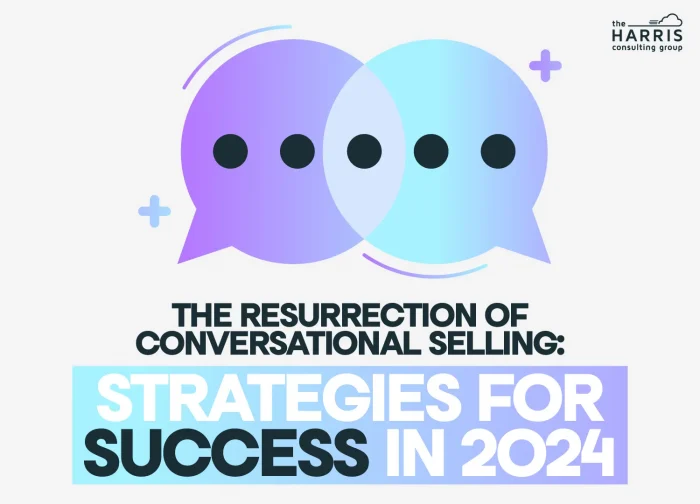In the dynamic landscape of sales, conversational selling has marked a significant shift in how businesses engage with customers. As we move into 2024, this approach has become more than a trend. It’s a fundamental strategy that aligns with the evolving expectations of buyers.
Conversational selling prioritizes creating a safe space for buyers and sellers to communicate in a meaningful way that builds mutual trust. In our mind, trust is rapport. Rapport is not trust. Let’s explore why conversational selling is critical for success in 2024 and share effective strategies to help you excel in this new era.
Understanding Conversational Selling
Conversational selling is the art of using conversations to move buyers through the sales funnel with an exceptional Buyer’s Experience. It’s about engaging with customers on a personal level and meeting them in their headspace. Moreover, it’s about using dialogue-based techniques in the words and phrases they use to discuss their own business objectives.
Conversational sales are not about reading PowerPoint or collateral generated by the marketing team that aligns more with your company’s desire for expression. Besides, it is often better when it aligns with customer’s needs to feel heard and what they want you to hear. This is a piece of adding value that is often overlooked. When done right it will help you close more deals.
Behind are the days when sales tactics prioritized the seller’s agenda over the buyer’s needs. In this increasingly digital age, where face-to-face interactions have become less frequent, conversational selling bridges the gap. It brings a human touch to sales processes.
It leverages the power of storytelling, active listening, and personalized communication. This enables sales professionals to connect with customers in a more meaningful way. By focusing on the customer’s needs and preferences, sales professionals can craft tailored solutions that resonate on a deeper level. It allows salespeople to foster loyalty and encourage them to repeat business. In short, we can help our prospects and customers fall in trust with us and our potential solutions.
This collaborative approach demystifies buying decisions, making them feel more like a natural conclusion than a pressured pitch. As buyers increasingly seek authenticity and transparency, conversational selling becomes a necessity for companies aiming to stay relevant and competitive. It’s a paradigm shift that redefines success in sales, emphasizing the quality of connections over the quantity of transactions.
Why Conversational Selling Is More Important Than Ever
Buyer Expectations Have Changed
In today’s market, the expectations of buyers have evolved significantly. Modern consumers demand more than generic sales pitches. They seek personalized, relevant interactions that speak directly to their unique needs and preferences.
They wish to engage in conversations that make them feel understood and valued, not merely as targets for a transaction. This shift underscores the importance of adopting a more nuanced, customer-centric approach to sales strategies. Here understanding and meeting the specific requirements of each buyer is paramount.
Your buyers are seeking an outstanding Buyer’s Experience through the Seller’s Journey.
Technology Enables Deeper Engagement
The advancements in technology, particularly in Artificial Intelligence (AI), chatbots, and various messaging platforms, have revolutionized the way businesses can interact with their customers.
These tools facilitate real-time, personalized communication, allowing for more dynamic and engaging conversations that can happen at any time, from anywhere. This accessibility to instant, tailored communication enhances the customer experience, making it possible for sales professionals to connect with their audience in a more meaningful and efficient manner.
The integration of these technologies into the sales process not only streamlines interactions but also provides valuable insights into customer preferences, enabling even more personalized engagement.
Building Trust Is Key
In a competitive marketplace brimming with alternatives, the ability to build and maintain trust with your customers is a definitive edge. Trust and authenticity are the cornerstones of successful relationships between businesses and consumers. In fact we believe authenticity is the key component to building trust.
Conversational selling plays a vital role in establishing these elements by encouraging genuine, transparent interactions. This approach helps in demystifying the sales process, making it more about mutual discovery and less about persuasion.
Generally speaking authenticity is a combination of prioritizing honesty, integrity, and empathy. Businesses can foster a sense of trust that transforms one-time buyers into loyal customers. In the long run, these genuine connections not only contribute to a positive brand perception but also to sustained business success.
Conversational selling aligns perfectly with this desire for authenticity. Moreover, it requires a shift in mindset from seeing sales as a transaction to viewing it as a collaborative process that values the buyer’s journey as much as the outcome.
This philosophy is rooted in trust and genuine connection. It sets conversational selling apart and makes it an indispensable strategy for businesses aiming to thrive in today’s consumer landscape.
Strategies for Success in Conversational Selling
To thrive in the age of conversational selling, adopt these strategies:
1. Prioritize Listening and Empathy
- Understand before being understood: Focus on truly understanding the customer’s needs, challenges, and goals. Active listening and empathy are your greatest tools in achieving this.
- Tailor your approach: Use insights gained from conversations to personalize your interactions. This shows that you value the customer’s unique situation.
2. Leverage Technology Wisely
- Understand AI and Chatbots will not sell for you. When done right they will enhance the Buyer’s Experience.
- Use AI and Chatbots for efficiency: Automate initial interactions without losing the personal touch. Use these tools to qualify leads and gather information, freeing up time for deeper, more meaningful conversations.
- CRM integration: Ensure your Customer Relationship Management (CRM) system integrates seamlessly with your conversational tools. This keeps all customer interactions and insights in one place, enabling better follow-up and personalization.
3. Focus on Providing Value
- Educate and inform: Use your expertise to educate your customers. Providing value through knowledge helps build credibility and trust.
- Solve, Don’t Sell: Approach every conversation with the mindset of solving a problem, not just making a sale. This often leads to better outcomes for both parties.
4. Be Authentic and Transparent
- Authenticity builds trust: In conversational selling, being genuine is more effective than any sales script. Authentic interactions foster stronger relationships.
- Transparency encourages confidence: Be open about what your product can and cannot do. Honesty in conversations builds confidence in your brand.
5. Train and Develop Your Team
- Skill Development: Ensure your sales team is trained in conversational selling techniques, including active listening, empathy, and effective questioning.
- Continuous Improvement: Encourage ongoing learning and adaptation. The conversational selling landscape will continue to evolve, and so will your strategies.
The Future of Sales
As we look toward the rest of 2024, it’s clear that conversational selling will play a pivotal role in shaping the future of sales. This approach meets the modern buyer’s expectations and enhances the selling experience. It makes the process more effective and enjoyable for both sellers and buyers.
By embracing these strategies, you can ensure your sales processes are ahead of the curve. Furthermore, you will position your business for success in the new era of sales. In this transformative period, focusing on genuine connections, leveraging technology, and continually enhancing your skills will be key to mastering conversational selling.
The goal is to create a sales environment where authenticity, personalization, and value lead the way, ensuring lasting success and customer satisfaction. Welcome to the future of sales, where conversations lead to success.







